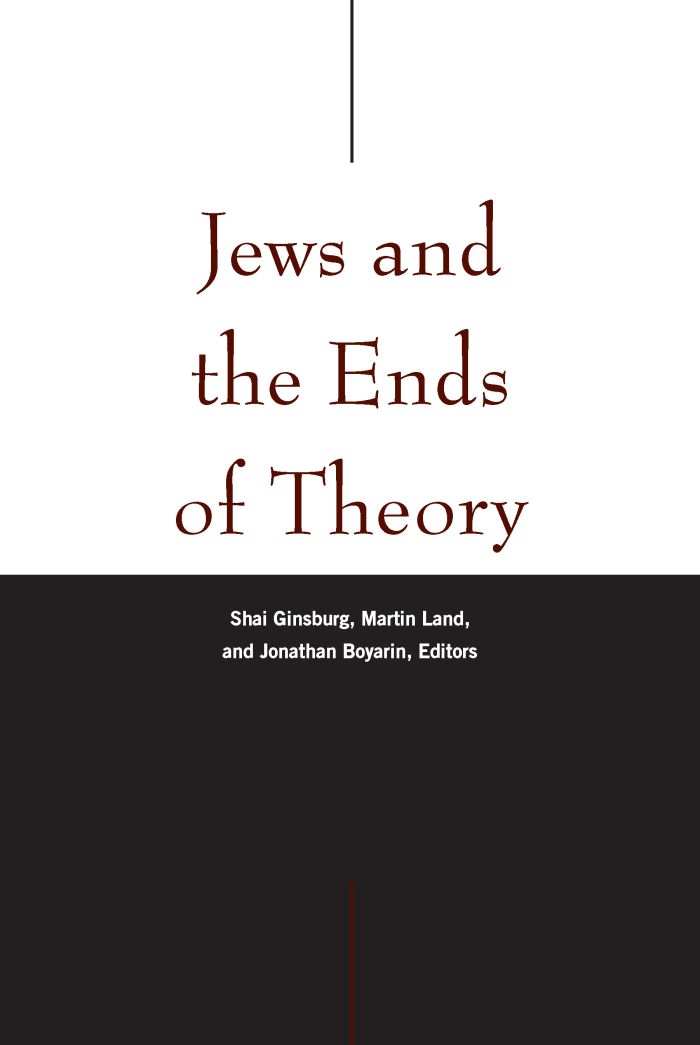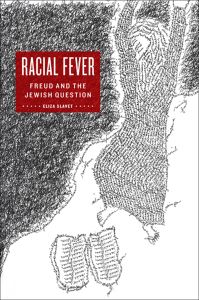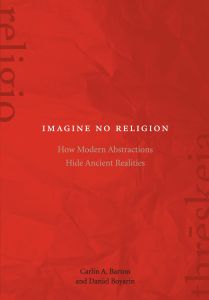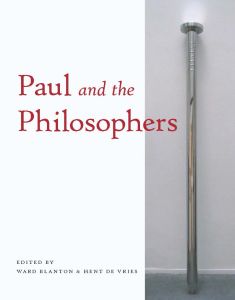Jews and the Ends of Theory

This book can be opened with

Theory, as it’s happened across the humanities, has often been coded as “Jewish.” This collection of essays seeks to move past explanations for this understanding that rely on the self-evident (the historical centrality of Jews to the rise of Critical Theory with the Frankfurt School) or stereotypical (psychoanalysis as the “Jewish Science”) in order to show how certain problematics of modern Jewishness enrich theory.
In the range of violence and agency that attend the appellation “Jew,” depending on how, where, and by whom it’s uttered, we can see that Jewishness is a rhetorical as much as a sociological fact, and that its rhetorical and sociological aspects, while linked, are not identical. Attention to this disjuncture helps to elucidate the questions of power, subjectivity, identity, figuration, language, and relation that modern theory has grappled with. These questions in turn implicate geopolitical issues such as the relation of a people to a state and the violence done in the name of simplistic identitarian ideologies.
Clarifying a situation where “the Jew” is not readily or unproblematically legible, the editors propose what they call “spectral reading,” a way to understand Jewishness as a fluid and rhetorical presence. While not divorced from sociological facts, this spectral reading works in concert with contemporary theory to mediate pessimistic and utopian impulses, experiences, and realities.
Contributors: Svetlana Boym, Andrew Bush, Sergey Dolgopolski, Jay Geller, Sarah Hammerschlag, Hannan Hever, Martin Land, Martin Jay, James I. Porter, Yehouda Shenhav, Elliot R. Wolfson
“A glittering collection of essays that asks how the critical gist of the Frankfurt School tradition as well as the work of other Jewish intellectuals such as Scholem, Derrida, Buber, and Auerbach is inflected by ‘the Jew.’ Beyond pointing to the biographies of many who have taken up critical theory, the volume shows how images and assumptions about the Jew and Jewishness, Ashkenazi vs. Sephardic Jewry, Israeli vs. diasporic Jewry, hover in the background of a range of texts and thinkers. A powerful collection that opens new vistas in our approach to social, cultural, and literary critical theories.”—Seyla Benhabib, Yale University
Collectively, the essays produce transgenerational dialogues centered in critical theory and offer significant insights into the idea of "the Jew."—Choice
...Jews and the Ends of Theory is a remarkable book bringing together several scholars dedicated to scrupulously peeling back the layers of meaning implicated in the claim that critical theory is, at base, "Jewish." It will surely serve as an indispensable resource for those intrigued by the intersection of Jewish studies and critical theory, as well as those concerned with the critical gesture itself, and the sense in which it has come to be bound up with Jewishness.—Reading Religion
Shai Ginsburg is Associate Professor of Asian and Middle Eastern Studies and Jewish Studies at Duke University.
Martin Land (Edited By)
Martin Land is Senior Lecturer in the Department of Computer Science at Hadassah College and the Open University of Israel.
Jonathan Boyarin (Edited By)
Jonathan Boyarin is Diann G. and Thomas A. Mann Professor of Modern Jewish Studies in the Departments of Anthropology and Near Eastern Studies at Cornell University.
Introduction: Jews, Theory, and Ends
Shai Ginsburg, Martin Land, and Jonathan Boyarin, 1
1. Leo Lowenthal and the Jewish Renaissance
Martin Jay, 27
2. The Palestinian Nakba and the Arab-Jewish Melancholy: An Essay on Sovereignty and Translation
Yehouda Shenhav, 48
3. The Ends of Ladino
Andrew Bush, 65
4. The Last Jewish Intellectual: Derrida and His Literary Betrayal of Levinas
Sarah Hammerschlag, 88
5. Jews, in Theory
Sergey Dolgopolski, 108
6. The Jewish Animot: Of Jews as Animals
Jay Geller, 142
7. The Off-Modern Turn: Modernist Humanism and Vernacular Cosmopolitanism in Shklovsky and Mandelshtam
Svetlana Boym, 164
8. Old Testament Realism in the Writings of Erich Auerbach
James I. Porter, 187
9. Buber versus Scholem and the Figure of the Hasidic Jew: A Literary Debate between Two Political Theologies
Hannan Hever, 225
10. Against the “Attack on Linking”: Rearticulating the “Jewish Intellectual” for Today
Martin Land, 263
11. Recovering Futurity: Theorizing the End and the End of Theory
Elliot R. Wolfson, 293
List of Contributors 313
Index 317




